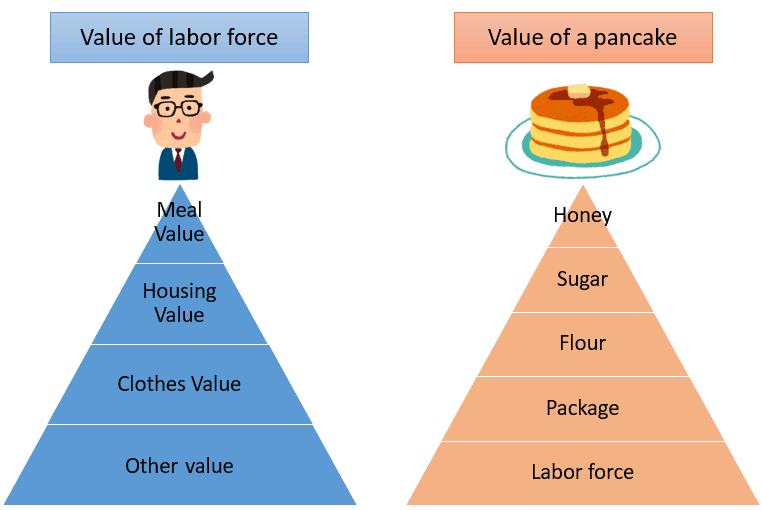Are you satisfied with your current salary? Do you feel you are paid less than you should be? In this article we will explain how your salary is calculated in a Japanese company and what you can do to increase it.
Salary structure in Japanese company
How the salary is determined
First of all, there are 2 different ways how a company can calculate your salary from an economic point of view.
- Required expense method:
You get a certain amount of money that will cover your living expenses for a month. - Profit sharing method:
You get a part of profit that you made during working.
The profit sharing method is often adopted by foreign financial companies. In this case, if you show a nice job performance and have good results, you will get higher monthly salary. However, if you can’t reach the target or show a bad job performance, your salary will decrease accordingly. Almost all traditional Japanese companies adopt the required expense method.
Recently, more and more Japanese companies advocate the result-based system, but since most of them implement it only as a part of the required expense method, it differs fundamentally from the profit sharing method and provides only a slight addition to your salary, without any possibility of a bigger raise. For example, it won’t be possible to get double salary, even if your sales result are double.
However, the required expense method has an advantage – employee’s salary increases with age. It is so due to the Japanese way of thinking which advocates that with age the living expenses increase. It is a stereotype that average employee would marry at the end of his 20s, get a child in his 30s, and the child/children go to university in his 40-50s. So, living expenses are expected to increase with time. That is why the required expense salary system calculates age-linked wages as well.
Understand “capital” of Karl Marx
It is very important in Japan to understand the definition of capital by Karl Marx. Far too many people think:
"Why isn't my salary increased even though I worked so hard!?" "Why hasn't my salary increased even though I reached such good results!?"
Such thinking is fundamentally wrong. People who realize that good job performance is important will be wanted in other companies. This demand raise will increase salary – but not job performance itself.
What we mean, is that it is important to see the difference between your “value-in-use” and “value”. An employee who has good job performance is “value in use”. An employee (as a labor force) highly demanded on the market is “value”. According to Marx’s theory, you need to increase your value, not value-in-use.
Economically speaking, your labor is a product, which has the same value as a pancake has. So in order to increase your salary, it is necessary to enhance your value as a labor force.

How can I get a higher price for my labor force?
Get qualifications & acquire skills
Acquire deep knowledge, broad experience and advanced skills. If a beginner was to do the same job as you, the company would have to pay for training and extra time. If your skills allow to skip the training, then the cost of “reproducing the workforce” is high.
Edit your abilities
For example, if you are a sales person, seek chances to use your skills in a different field. Maybe you can offer a seminar or training on your know-how, or try consulting. You must have something that can be converted into something different that is demanded. Then you could have additional earnings through side jobs. It also can be an additional point during job interview.
Invest, don’t consume, your labor force
Don’t pursue the immediate cash. Ignore rewards in front of you, such as overtime pay or incentives. A job into which you can and should invest your workforce is a job that you can see as your future. Here is a simple example:
・Gas station staff: $12/h ・Employee job support at startup company: $8/h
Surely, the second option is a better choice in terms of a long-term plan.
Dare to choose the industry / occupation where the change is slow
If you have 2 choices as per below to change your job, which one would you choose?
- Internet industry
- Construction industry
Of course, internet industry is very modern and will absolutely grow for the coming decades. But to choose the construction industry intentionally might be a cleverer choice. In this industry, new products and technologies are not easily born, and business is conducted in a relatively traditional way – especially if we’re talking about Japan, where the change speed is really rapid in internet and smartphone industries, which means short shelf life of knowledge and technology. So, if you’d like to avoid regular innovation trainings, why not to choose an industry that changes slower?
Summary
We would like to say that there are no shortcuts to becoming a billionaire in a Japanese company. Of course, if you are very talented, you could jack up your salary easily, but most of us are not geniuses. Plan a long-term strategy to enhance your value as a manpower. The question you should ask yourself every day is “How much did you work for things that will lead to future?”. Don’t stick to fulfilling the urgent tasks on your today’s to-do list. Stick to the to-do list for your long-term self-growth.























